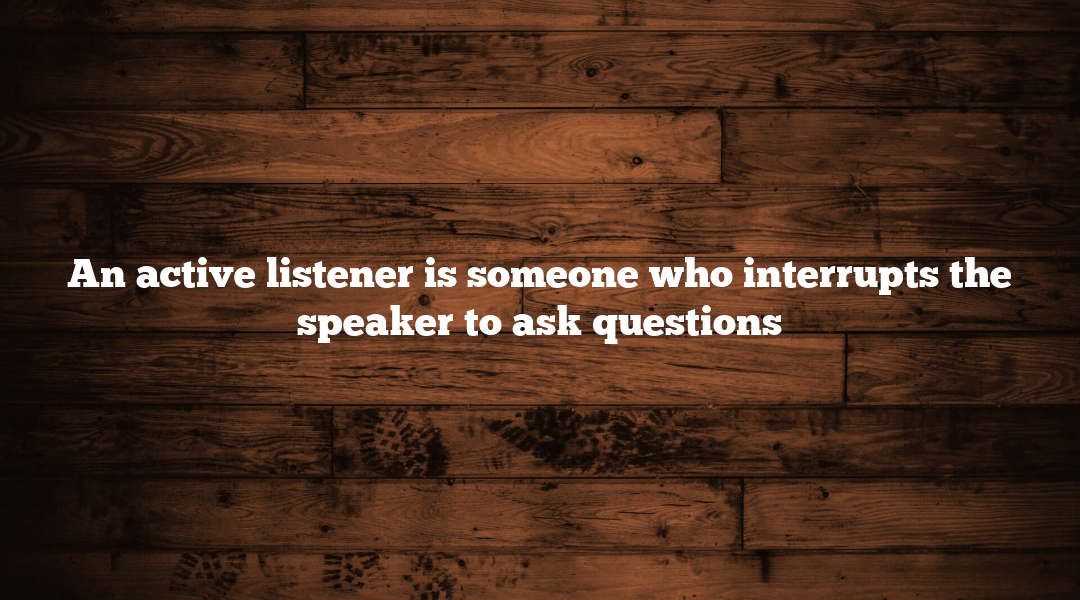An active listener is someone who interrupts the speaker to ask questions
In the world of communication, active listening is the unsung hero. It goes beyond hearing words; it’s about truly understanding, empathizing, and engaging with the speaker on a profound level. A key instrument in an active listener’s toolkit is the art of strategic questioning. While silence is often seen as the hallmark of a good listener, asking the right questions at the right time can amplify the power of active listening and unlock a world of benefits. In this exploration, we delve into the advantages of strategic questioning as an essential component of active listening.
The Essence of Active Listening
Before we delve into the role of strategic questioning, let’s revisit the core of active listening and its significance in our lives.
Building Trust and Connection
Active listening lays the foundation for meaningful connections and relationships. It communicates to the speaker that their perspective matters, fostering trust and rapport.
Enhancing Problem-Solving
In both personal and professional realms, active listening is a linchpin in effective problem-solving. By truly understanding a situation or issue, you can offer informed solutions and contribute meaningfully.
Reducing Misunderstandings
Miscommunication often stems from a lack of active listening. By fully engaging in a conversation, seeking clarification when necessary, and asking questions, you can significantly reduce misunderstandings and conflicts.
Cultivating Empathy
Active listening necessitates immersing oneself in the speaker’s world, understanding their emotions, and respecting their experiences. This not only deepens your understanding but also nurtures empathy—an indispensable quality in building healthy relationships.
Strategic Questioning: The Catalyst for Connection
Now, let’s explore how strategic questioning can augment active listening and unearth a multitude of benefits:
1. Encouraging Elaboration
Strategic questions encourage the speaker to expand on their thoughts and feelings. They create space for the speaker to share more of their perspective. For instance, instead of a closed-ended question like “Did that bother you?” you could ask, “Can you tell me more about your feelings in that situation?”
2. Demonstrating Interest
When you ask strategic questions, you signal a genuine interest in what the speaker is saying. This can make them feel valued and heard, fostering a deeper sense of connection and trust. Questions like “Can you explain that further?” convey your commitment to understanding their viewpoint.
3. Clarifying Information
Strategic questions are invaluable for seeking clarification when the speaker uses unclear language or introduces unfamiliar concepts. By asking for further explanation, you ensure that you fully grasp their message. For example, “I’m not familiar with that term; could you explain it further?”
4. Empathizing and Supporting
Strategic questions that delve into the speaker’s emotions and experiences demonstrate empathy and support. For example, “How has this situation been affecting you emotionally?” or “What can I do to help?” show that you genuinely care about their well-being.
5. Redirecting the Conversation
Strategic questions can also serve as a tool for gently steering the conversation in a more productive direction. If the discussion veers off-topic or becomes unproductive, a well-placed question can refocus it. For instance, “That’s an interesting point, but going back to our main topic, how do you think we should proceed?”
Mastering the Art of Strategic Questioning
Strategic questioning is not a one-size-fits-all endeavor; it requires finesse and practice. Here are some guidelines to help you become a skilled questioner:
1. Start with Open-Ended Questions
Open-ended questions invite the speaker to share more than a simple “yes” or “no” response. They encourage detailed and meaningful answers. Examples include “How do you feel about…?” or “What are your thoughts on…?”
2. Be Patient and Listen Actively
Effective strategic questioning goes hand in hand with active listening. Listen carefully to the speaker’s response to your previous question before formulating the next one. Avoid interrupting or rushing the conversation.
3. Use Non-Verbal Cues
Non-verbal cues, such as maintaining eye contact, nodding, and using facial expressions, communicate your engagement and interest in the conversation. They reassure the speaker that you are actively listening and respecting their input.
4. Reflect and Formulate
After the speaker answers your question, take a moment to reflect on their response. This demonstrates that you genuinely consider their perspective and allows you to formulate more thoughtful follow-up questions.
Challenges and Pitfalls to Avoid
While strategic questioning is a powerful tool in active listening, there are challenges and pitfalls to be aware of:
1. Avoid Leading Questions
Leading questions can bias the speaker’s response and steer the conversation in a specific direction. Instead of asking, “Don’t you agree that…?” try open-ended inquiries like “What are your thoughts on…?” to encourage unbiased responses.
2. Balance Questioning and Listening
Strive for a balanced conversation where you actively listen, use non-verbal cues, and ask questions. Avoid dominating the conversation with an excessive number of inquiries.
3. Steer Clear of Judgmental Queries
Questions that come across as judgmental or confrontational can hinder communication. Aim for questions that promote understanding and empathy rather than defensiveness.
4. Refrain from Interruptions
Respect the flow of the conversation by refraining from interrupting the speaker. Allow them to finish their thoughts before asking your next question.
Benefits of Strategic Questioning in Active Listening
Now that we’ve explored the nuances of strategic questioning, let’s uncover the benefits it brings to active listening:
1. Deeper Understanding
Strategic questions allow you to delve deeper into the speaker’s thoughts and feelings, providing a more comprehensive understanding of their perspective.
2. Enhanced Connection
By demonstrating genuine interest and empathy through strategic questions, you foster a stronger sense of connection and trust between you and the speaker.
3. Improved Problem-Solving
Strategic questioning equips you with the insights needed to contribute effectively to problem-solving and decision-making processes.
4. Conflict Resolution
By reducing misunderstandings and fostering open communication, strategic questioning plays a crucial role in resolving conflicts and disagreements.
5. Nurturing Empathy
Strategic questions not only uncover the speaker’s emotions but also cultivate empathy, enhancing your ability to relate to and support others.
Conclusion
Strategic questioning is the catalyst that propels active listening from a passive state of silence to an engaged and profound connection. When used effectively, it encourages dialogue, elicits deeper insights, demonstrates genuine interest, and guides conversations in meaningful directions.
Incorporating the art of strategic questioning into your active listening repertoire takes practice, but the rewards are substantial. By becoming a skilled questioner, you not only deepen your understanding of others but also strengthen your connections and foster more meaningful relationships in both your personal and professional life.
So, the next time you find yourself in a conversation, remember the power of strategic questions and how they can unlock the doors to richer, more profound communication, ultimately enhancing your active listening skills and forging deeper connections with those around you.






